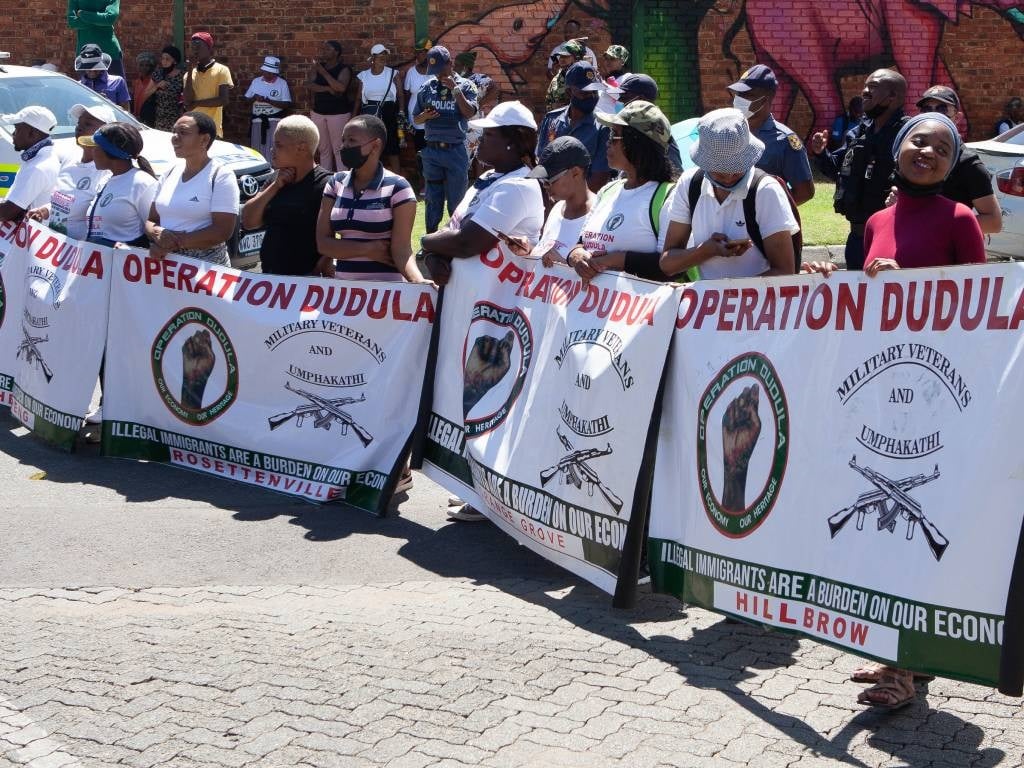
The South African government often turns a blind eye to its marginalised communities, and instead of alleviating the situation, there has been widespread corruption and misappropriation of funds, write Thelma Nyarhi Nontando and Paul Kariuki.
Africa’s encounters have ignited numerous conversations around identity, citizenship, and belonging. While not new to the literary archives, migration finds itself trapped in the emergent. New perspectives are constantly birthed and reviewed.
Although vulnerable in their existence, migrants are constantly reminded of their frontiers. As marginalised beings, with or without proper documentation, they are no better than a stranger. Despite foraging their way through nightmares in their neighbour’s homestead, the migrant still fights for their dreams. There lingers an element of unrest in and around communities. Violence encapsulates the migrants lived experience be it physically or emotionally. They are nothing but frontier beings who constantly have to negotiate their existence with the popular forces that be.
As an outsider in both the home and host country, they find themselves at the receiving end of the conflict. With nothing much to hold onto, endurance and resistance fuel their quest to survive. Violence though loathed, has become the social currency of existence, a social pandemic. Through it, changes are forged for the good or bad of the people. To some extent, one comes to appreciate, question, and at the same time, feel helpless about this social pandemic. How does the migrant navigate such an environment? To begin with, it may be worth noting the manner in which locals and migrants relate to one another.
No solid borders
Pre-covid-19, xenophobic tendencies against most African migrants particularly Zimbabweans had propagated through the years. With the onset of the pandemic, relatability changed to blur citizenship ideals. In as much as it is crippling in its invisible state it is also a blessing in disguise. Through it, many teachings were harvested.
In its global evangelism, we began to realise the fact that the world has no solid borders, so much for Trumps’ Great Wall philosophy. We found ourselves brought down to life’s mercies. In its homogenising effect of spreading globally across all social structures, we found ourselves being schooled by it. What would a borderless world look like?
Like the government, Covid-19 has conditioned humans to a new way of life. The purpose of the government is to maintain order and protect citizens from external threats among others. Through social distancing regulations, it has maintained order. And what of protecting the citizens from external threats, has it not? With the terror the pandemic brought about, wars were neutralised.
READ | ANALYSIS | Joy Owen: We are all responsible for crime
To some extent, global peace and the citizen’s safety from death in combat were upheld. The way the pandemic has rather imposed itself on the global community, it exhumes teachings of systems of government. In some way, the virus assumes the post of a unitary government. We find ourselves in the front seat, learning of the effects of a single government. For one, there is no agency nor regard for human rights. The assumed titles of citizenship become a nebulous reality. To some extent, we are all strangers to the lands we claim as home. Who or what is the South African government currently protecting?
During the onset of Covid-19, we witnessed a slowing down of global conflict encounters. How could anyone fight with a viral warden patrolling the air surrounding us? Covid-19 had everyone in a choke hold, lockdown was nothing out of the ordinary. This period all the way through 2020 – 2021 brought with it reimaginations of the known and unknown. At one point, our humanity was reignited; migrants and citizens were one. They were intimate strangers brought together by precarity. This quickly faded, as 'normality’ somewhat pieced itself back together.
Economic activity regained popularity, mobility was restored, and the nimbleness for survival resumed. It was not long after clashes between locals and the migrant community resurfaced. But what is surfacing? It has come to the fore that the pandemic unveiled many dysfunctionalities in the state. Faced with a failing economy, efforts have been centered around economic recovery with a large focus on repatriation.
The South African government often turns a blind eye to its marginalised communities, and instead of alleviating the situation, there has been widespread corruption and misappropriation of funds. Now faced with trials, the country is subdued to an awakening call requiring social justice. With the worst of the Covid-19 over, recovery steps have carved their way into vigilantism.
Security vs. Justice
Convinced of migrants weighing down the state resources and stealing opportunities, locals have taken it upon themselves to 'clean up' their localities of all migrants believed to be undocumented. Spearheaded by the Operation Dudula campaign - an anti-immigration group, efforts towards driving out immigrants willingly or unwillingly have been made.
READ | Mpumelelo Mkhabela: Operation Dudula - Where is the leadership from our police and politicians?
As of mid-2018, a survey carried out by Afrobarometer had compiled findings around local perspectives of migrants. Of the 1 800 South African adult citizens sample, 62% had expressed disdain for the manner in which the government was handling immigration. 29% disliked the idea of having migrants or asylum seekers as their neighbours. These figures may have changed or even increased over time with the raging Operation Dudula.
The movement constituting mostly the subaltern hopes to galvanise the state into migration policy action that serves to protect local resource interests. This invites conversations around moral pluralities evoked by the various forms of vigilantism. Be it localised or spontaneous, their presence has put migrants in an even more vulnerable state of harm. Justice is not necessarily important as long as security is upheld.
The proposed National Labor Migration Policy (NLMP) stresses the importance of migrant safety. This is premised on the need for clear policy framing, operationalisation, and regulation, processes that have been missing for years.
Reactive action
For years state action was based on reactive action. Through the years, it has been revealed that an unclear policy has created many loopholes and caused unrest. Within the proposed policy the idea of migrant safety rallies around occupational safety. Having collaborated with the Department of Home Affairs (DHA), the National Department of Labor and Employment (DEL) hopes to regulate the migration patterns within the country. Of the vulnerable regarded persons, irregular (undocumented) migrants’ women and children make the list.
The safety of these persons hopes to ensure human rights, including healthcare, education, and occupational safety. On the topic of xenophobia, the proposed policy embraces the National Development Plan (NDP) in facilitating sustained campaigns as a countermeasure. How does this translate to reality? Documented or not, how can safety be enabled for such persons? It is a tale only on paper.
Following the immigration policy review at the ANC national elective conference, attention will be on the verdict. One thing is clear safety is no guarantee. How can it be in a country that has communicated through acts of violence for over decades?
Violence is a language, an inheritance that has propagated from apartheid to post-apartheid. It is an encrypted cry for help. Since apartheid, violence has been the only way to catch the attention of the state. True to the textured images of colonial inheritance, the damages imparted by colonialisation proliferate. It is this preoccupation with histories that conditions spaces and bodies into visual artefacts of pain and violence.
- Thelma Nyarhi Nontando is a research intern at the Democracy Development Program (DDP). Dr. Paul Kariuki is the Executive Director of the Democracy Development Program (DDP). The views expressed are their own.
*Want to respond to the columnist? Send your letter or article to opinions@news24.com with your name and town or province. You are welcome to also send a profile picture. We encourage a diversity of voices and views in our readers' submissions and reserve the right not to publish any and all submissions received.
Disclaimer: News24 encourages freedom of speech and the expression of diverse views. The views of columnists published on News24 are therefore their own and do not necessarily represent the views of News24.




 Publications
Publications
 Partners
Partners























